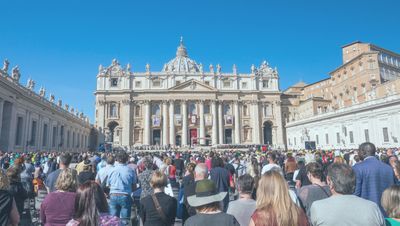[Editor's Note: This essay is in response to our current Big Question series: "How can the religious and scientific communities work together to foster a culture that is equipped to face humanity's biggest challenges?"]
In May 2015, Pope Francis issued an encyclical with the subtitle "On Care for Our Common Home." The letter addressed various environmental issues, such as pollution and climate change, and it reminded all of us that we are to steward the Earth, not plunder it.
Without question, biotechnology has saved the lives of millions – perhaps billions – of people.
The Pope's missive demonstrates that he is both theologically sound and scientifically literate, a very rare combination. That is why he should now author an encyclical urging the world to embrace the life-giving promise of biotechnology.
Without question, biotechnology has saved the lives of millions – perhaps billions – of people. Arguably, vaccines were the most important invention in the history of mankind. It is thought that, in the 20th century alone, at least 300 million people were killed by smallpox. Today, the number is zero, thanks to vaccination. Other killers, such as measles, diphtheria, meningitis, and diarrhea, are kept at bay because of vaccines.
Biotechnology has also saved the lives of diabetics. At one time, insulin was extracted from pig pancreases, and there were fears that we would run out of it. Then, in the 1970s, crucial advances in biotechnology allowed for the gene that encodes human insulin to be expressed in bacteria. Today, diabetics can get extremely pure insulin thanks to this feat of genetic modification.
Likewise, genetic modification has improved the environment and the lives of farmers all over the world, none more so than those living in developing countries. According to a meta-analysis published in PLoS ONE, GMOs have "reduced chemical pesticide use by 37%, increased crop yields by 22%, and increased farmer profits by 68%."
Even better, GMOs also could help improve the lives of non-farmers. In poor parts of the world, malnutrition is still extremely common. People whose diets consist mostly of rice, for example, often suffer from vitamin A deficiency, which can lead to blindness. Golden Rice, which was genetically modified to contain a vitamin A precursor, was created and given away for free in an act of humanitarianism. Other researchers have created a genetically modified cassava to help combat iron and zinc deficiencies among children in Africa.
Despite these groundbreaking advances, the public is turning against biotechnology.
Biotechnology has also helped women with mitochondrial disease bear healthy children. Children inherit their mitochondria, the powerhouses of our cells, solely from their mothers. Mitochondrial defects can have devastating health consequences. Using what is colloquially called the "three-parent embryo technique," a healthy woman donates an egg. The nucleus of that egg is removed, and that of the mother-to-be is put in its place. Then, the egg is fertilized using conventional in vitro fertilization. In April 2016, the world's first baby was born using this technique.
Yet, despite these groundbreaking advances, the public is turning against biotechnology. Across America and Europe, anti-vaccine activists have helped usher in a resurgence of entirely preventable diseases, such as measles. Anti-GMO activists have blocked the implementation of Golden Rice. And other activists decry reproductive technology as "playing God."
Nonsense. These technologies improve overall welfare and save lives. Those laudable goals are shared by all the world's major religions as part of their efforts to improve the human condition. That is why it is vitally important, if science is to succeed in eradicating illness, that it gets a full-throated endorsement from powerful religious leaders.
In his 2015 encyclical, Pope Francis wrote:
Any technical solution which science claims to offer will be powerless to solve the serious problems of our world if humanity loses its compass, if we lose sight of the great motivations which make it possible for us to live in harmony, to make sacrifices and to treat others well.
He is correct. Indeed, when people are protesting life-saving vaccines, we have lost not only our moral compass but our intellect, too.
Imagine the impact he could have if Pope Francis issued an encyclical titled "On Protecting Our Most Vulnerable." He could explain that some children, stricken with cancer or suffering from an immunological disease, are unable to receive vaccines. Therefore, we all have a moral duty to be vaccinated in order to protect them through herd immunity.
Or imagine the potential impact of an encyclical titled "On Feeding the World," in which the Pope explained that rich countries have an obligation to poorer ones to feed them by all means necessary, including the use of biotechnology. If Muslim, Buddhist, and Hindu scholars throughout Asia and Africa also embraced the message, its impact could be multiplied.
In order to be successful, science needs religion; in order to be practical, religion needs science.
In order to be successful, science needs religion; in order to be practical, religion needs science.
Unfortunately, in discussions of the relationship between science and religion, we too often focus on the few areas in which they conflict. But this misses a great opportunity. By combining technological advances with moral authority, science and religion can work together to save the world.
[Ed. Note: Don't miss the other perspectives in this Big Question series, from a Rabbi/M.D. and a Reverend/molecular geneticist.]
